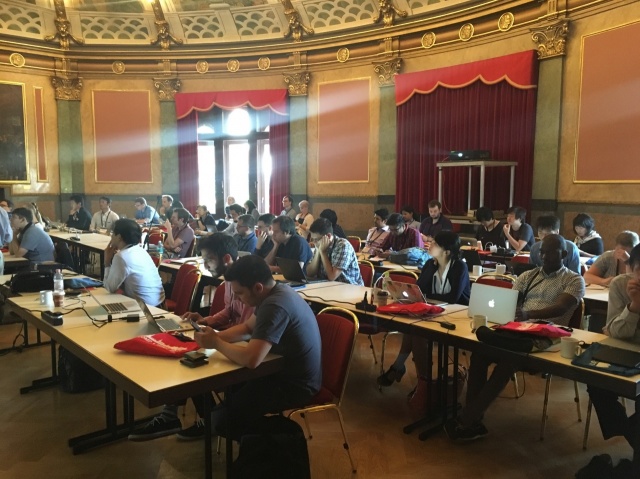Welcome to HASCA2016 Web site!
HASCA2016 is a fourth workshop for Human Activity Sensing Corpus and Application: Towards Open-Ended Context Awareness. The workshop will be held in conjunction with UbiComp2016.
** Worksop Program is now open **
Abstract
Technological advances enable the inclusion of miniature sensors (e.g. accelerometers, gyroscopes) on a variety of wearable/portable information devices. Most current devices only utilize these sensors for simple orientation and gesture recognition. However in the future the recognition of more complex and subtle human behaviours from these sensors will enable next-generation human-oriented computing in scenarios of high societal value (e.g. dementia care). This will require large scale human activity corpuses and much improved methods to recognize activities and the context in which they occur. This workshop deals with the challenges of designing reproducible experimental setups, running large scale dataset collection campaigns, designing activity and context recognition methods that are robust and adaptive, and evaluating systems in the real world.
As a special topic this year, we wish to reflect on the challenges and possible approaches to recognize situations, events or activities outside of a statically pre-defined pool - which is the current state of the art - and instead adopt an open-ended view on activity and context awareness. Following the huge success of previous years, we are further planning to share these experiences of current research on human activity corpus and their applications among the researchers and the practitioners and to have a deep discussion on the future of activity sensing, in particular towards open-ended contextual intelligence.
We solicit the following topics (but not limited to).
Data collection / Corpus construction
Experiences or reports from the data collection and/or corpus construction projects. Also includes the papers which describing the formats, styles or methodologies for data collection. Cloud-sourcing data collection or participatory sensing also could be included in this topic.
Effectiveness of Data / Data Centric Research
There is a field of research based on the collected corpus, which is called “Data Centric Research”. Also, we solicit of the experience of using large-scale human activity sensing corpus. Using large-scale corpus with machine learning technology, there will be a large space for improving the performance of recognition results.
Tools and Algorithms for Activity Recognition
If we have appropriate and suitable tools for management of sensor data, activity recognition researchers could be more focused on their research theme. However, development of tools or algorithms for sharing among the research community is not much appreciated. In this workshop, we solicit development reports of tools and algorithms for forwarding the community.
Real World Application and Experiences
Activity recognition “in the Lab” usually works well. However, it is not true in the real world. In this workshop, we also solicit the experiences from real world applications. There is a huge gap/valley between “Lab Environment” and “Real World Environment”. Large scale human activity sensing corpus will help to overcome this gap/valley.
Sensing Devices and Systems
Data collection is not only performed by the “off the shelf” sensors. There is a requirement to develop some special devices to obtain some sort of information. There is also a research area about the development or evaluate the system or technologies for data collection.
In light of this year's special emphasis on open-ended contextual awareness, we wish cover these topics as well:
Mobile experience sampling, experience sampling strategies:
Advances in experience sampling approaches, for instance intelligently querying the user or using novel devices (e.g. smartwatches) are likely to play an important role to provide user-contributed annotations of their own activities.
Unsupervised pattern discovery
Discovering meaningful repeating patterns in sensor data can be fundamental in informing other elements of a system generating an activity corpus, such as inquiring user or triggering annotation crowd sourcing.
Dataset acquisition and annotation through crowdsourcing,
web-mining
A wide abundance of sensor data is potentially in reach with users instrumented with their mobile phones and other wearables. Capitalising on crowd-sourcing to create larger datasets in a cost effective manner may be critical to open-ended activity recognition. Online datasets could also be used to bootstrap recognition models.
Transfer learning, semi-supervised learning, lifelong learning
The ability to translate recognition models across modalities or to use minimal supervision would allow to reuse datasets across domains and reduce the costs of acquiring annotations.

